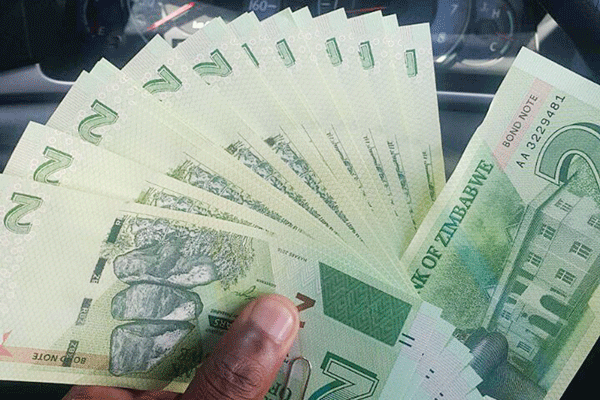
TRADERS who rely on foreign currency are now in a lurch following government’s criminalisation of the selling of cash on the parallel market.
BY FIDELITY MHLANGA
The government recently outlawed selling of foreign currency in the streets, prescribing a 10-year jail term for offenders in a bid to stem the black market, which had gotten out of hand.
The black market has been a source of foreign currency for shops, retailers and cross border traders.
This also comes at a time the Reserve Bank of Zimbabwe (RBZ) has licenced 11 forex bureaux de change and maintaining the dollar-bond note parity.
RBZ also prescribed that the exchange rate between the dollar or bond note with other currencies “shall be at a fee spread of not more than 10% of the nominal value of either currency”.
The bond note had weakened in recent weeks on the parallel market, with US$100 fetching $130 in bond notes on Friday.
RBZ governor John Mangudya told Standardbusiness last week that those seeking forex have to use the formal channels.
- Chamisa under fire over US$120K donation
- Mavhunga puts DeMbare into Chibuku quarterfinals
- Pension funds bet on Cabora Bassa oilfields
- Councils defy govt fire tender directive
Keep Reading
“Why go to the Roadport to exchange money? So far we have licensed 11 bureaux de change,” he said.
A number of shop owners fly to South Africa, Zambia, Tanzania, Turkey and United Arab Emirates, among other countries, to buy their merchandise.
Most Zimbabweans eke a living by importing products for resell such as motor vehicle spares, clothes, and electrical wares, among others.
Forex dealers have become a de facto bureau de change in the country but were forced off the streets after President Robert Mugabe enacted Statutory Instrument 122A of 2017 — Exchange Control (Amendment) Regulations 2017 (No 5) — which criminilised cash dealing.
The legislation, under (2c) (a) gives power to an authorised officer or a police officer to seize cash that “upon a reasonable suspicion that the possessor thereof is dealing in it unlawfully, that is, in contravention of any order or any provision of the Act or these regulations by virtue of which the order is made.”
The legislation also prescribes a 10-year jail sentence should the person in possession of cash be found guilty.
The seized cash will be deposited at the RBZ as exhibit pending prosecution.
“RBZ must register many bureaux de changes so that we can at least get foreign currency because as it stands, we are in a dilemma,” said Florence Gambe, who operates a boutique in Harare’s central business district.
A trader who buys clothes from South Africa for resale in Zimbabwe said her business was walking on thin ice as she had nowhere to get the rand to restock.
She is now relying on her friends in South Africa who buy her stock and she in turn transfers money from local banks and pay to relatives in Zimbabwe.
Banks have also reduced limits on MasterCard and Visa debit cards for transactions outside the country as the forex crisis worsens.
While some manufacturing companies rely on RBZ to get forex allocations, Confederation of Zimbabwe Retailers president Denford Mutashu last week said industrialists and retailers were sourcing at least 25% of their foreign currency requirements from the black market.
Mutashu said the clampdown on illegal forex traders required RBZ to license more forex bureaux.
“The bureaux de changes are a common phenomena in most developing and developed economies and a service that should have been there anyway,” he said.
“Banks should play a critical role also given the number of banks in the country.”
Zimbabwe Cross Border Traders Association secretary general Augustine Tawanda said traders whose business relied on importing commodities suffered the most due to poor access to foreign currency.
“The trader who relies on imports will have a problem but the trader who relies on exports won’t have a problem because he or she generates forex,” he said.











